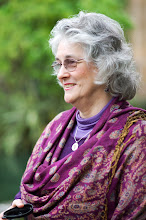Last night I spoke on an interfaith panel sponsored by by Beta Beta Sigma chapter of Phi Theta Kappa. the Honor Society at the Napa Valley College in Napa, California, part of a study called "Gods, Gold, Glory and The Global Dynamics of Power." This taste of world religions forum of seven panelists was comprised of Jewish, Islamic, Buddhist, non-denominational Christianity (represented by a Presbyterian minister), "Goddesses-based Wicca"* [sic], contemporary Pagan, and Religious Science speakers.
I estimate there were 150-200 people in the cafeteria for this event, some of whom were attending for credit. All were attentive. Many were taking notes, and some of us provided handouts. I had prepared a two-page selected bibliography on Pagan studies specifically for this venue. I think it's a good one; let me know if you'd like a copy.
In two hours, including Q&A, we each had a whopping eight minutes to lay out our "beliefs and practices." How can you do that about any religion, much less such a diverse cluster of religions as contemporary Paganism? Aiyee! I was saved having to speak of beliefs because I believe, as Michael York (the scholar, not the actor) explains in his book Pagan Theology, that what unites us is more practice than actual belief. Within an individual coven or circle you can find differences in belief about what all are doing together. That wasn't much help, though, when you consider the complexity of Paganism, the very meaning of the word Pagan. Not to mention the various groups that fall under the large umbrella of Paganism: Witches & Wiccans, Druids, Heathens, reconstructionists, ethnic religions, the meaning of the very word Pagan, etc. As well as the need to address the meanings of such symbols as the pentacle; what magic is (or might be) and the ethics of spellcrafting; immanence; revealed vs. experiential; polytheism, pantheism, panentheism and all the other "isms." I was doing my best, talking fast, wandering far and wide, when the bell rang signaling that my time was up.
Henry Michalski from Congregation Beth Sholom spoke very well from a prepared speech. The Presbyterian minister spoke as though he were giving a sermon, not in the sense of trying to convert people but more in his style. An intense young Muslim named Basim Elkarra from the Sacramento Valley CAIR (Council on American-Islamic Relations) spoke about Islam; Maxine Wright from Mahakaruna Buddhist Meditation Center spoke about Buddhism; Leilani Birely of Daughters of the Goddess Dianic coven spoke well about goddess spirituality and sang a Hawaiian devotional song. And finally Rev. Janet Garvey Stangvik representing the Napa Valley Center for Spiritual Living spoke authoritatively on religious science. Leilani's talk and mine complimented one another. It's strange, though, that there were two Pagans when we are such a minority of the population, yet no one from Roman Catholic, Native American, African diaspora religions, or Hindu religions, considering the presence of all those religions in Northern California's multicultural population.
A common concern spoken of by all speakers was for tolerance and a world of peace. This was especially true among the three Abrahamics presented; it was also the underlying concern of most of the audience questions. Leilani spoke of the fact that she considers animals and the wind and sea and Nature to be relatives and teachers. I was the only person who mentioned green awareness, our interdependence on all of life, the necessity of a sustainable future for our descendants.
Phi Theta Kappa did a great job producing this event. Judging from the turnout and questions, I'd say it was edifying and appreciated. I was glad for the opportunity to participate.
It makes me think, though, that I could teach a semester on Pagan religions if I could find the right sponsor for such a course. I have nothing formal beyond a B.A., but lots of life experience and independent scholarship of sorts. The authority by which I do such activities is my P&W. I take it seriously.
* This was how it was listed in the program, but the speaker actually said she was talking about goddess spirituality, which seemed much more accurate to me.
Subscribe to:
Post Comments (Atom)

5 comments:
I'd like a copy of the bibliography Macha.
JoHanna, please send me your e-addy so I can send you a copy.
I would also like a copy of the bibliography, please. I am always looking to find out what others are recommending.
Will you send me a copy of the reading list? Thanks!
Post a Comment